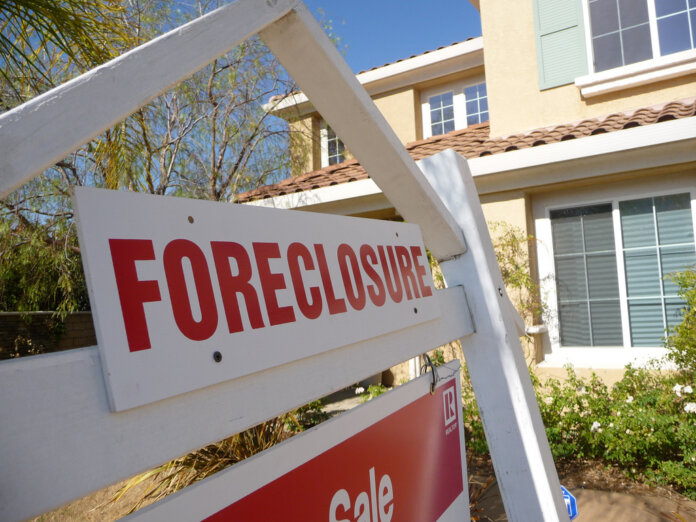ATTOM’s Midyear 2022 U.S. Foreclosure Market Report shows there were a total of 164,581 U.S. properties with foreclosure filings – default notices, scheduled auctions or bank repossessions – in the first six months of 2022. That figure is up 153% from the same time period a year ago but down just 1% from the same time period two years ago.
“Foreclosure activity across the United States continued its slow, steady climb back to pre-pandemic levels in the first half of 2022,” says Rick Sharga, executive vice president of market intelligence at ATTOM. “While overall foreclosure activity is still running significantly below historic averages, the dramatic increase in foreclosure starts suggests that we may be back to normal levels by sometime in early 2023.”
Bucking the national trend with decreasing foreclosure activity compared to a year ago in the nation’s most populated metros during the first half of 2022, were only seven of the 223 metro areas analyzed. Those metros included Lake Havasu, Ariz. (down 47%); Eugene, Ore. (down 27%); Springfield, Ill. (down 19%); Shreveport, La. (down 9%); and Brownsville, Texas (down 8%).
Nationwide 0.12% of all housing units (one in every 854) had a foreclosure filing in the first half of 2022.
States with the highest foreclosure rates in the first half of 2022 were Illinois (0.26% of housing units with a foreclosure filing), New Jersey (0.24%), Ohio (0.21%), Delaware (0.20%) and South Carolina (0.19%).
Other states with first-half foreclosure rates among the 10 highest nationwide, were Florida (0.18%), Nevada (0.18%), Indiana (0.16%), Georgia (0.13%) and Michigan (0.13%).
Among 223 metropolitan statistical areas with a population of at least 200,000, those with the highest foreclosure rates in the first half of 2022 were Cleveland, Ohio (0.40% of housing units with foreclosure filings); Atlantic City, N.J. (0.33%); Jacksonville, N.C. (0.31%); Chicago, Ill. (0.30%); and Columbia, S.C. (0.30%).
Other metro areas with foreclosure rates ranking among the top 10 highest in the first half of 2022 were Rockford, Ill. (0.30% of housing units with a foreclosure filing); Lakeland, Fla. (0.27%); Akron, Ohio (0.24%); Fayetteville, N.C. (0.24%); and Trenton, N.J. (0.23%).
A total of 117,383 U.S. properties started the foreclosure process in the first six months of 2022, up 219% from the first half of last year and up 19% from the first half of 2020.
States that saw the greatest number of foreclosures starts in the first half of 2022 included California (12,805 foreclosure starts), Florida (11,448 foreclosure starts), Tennessee (10,970 foreclosure starts), Illinois (8,411 foreclosure starts) and Ohio (6,987 foreclosure starts).
“It’s important to note that many of the foreclosure starts we’re seeing today – in fact, much of the overall foreclosure activity we’re seeing right now – is on loans that were either already in foreclosure or were more than 120 days delinquent prior to the pandemic,” Sharga adds. “Many of these loans were protected by the government’s foreclosure moratorium, or they would have already been foreclosed on two years ago. There’s very little delinquency or default activity that’s truly new in the numbers we’re tracking.”
Lenders foreclosed (REO) on a total of 20,750 U.S. properties in the first six months of 2022, up 30% from the last half of 2021 and up 113% from the first half of 2020.
States that posted the greatest number of REOs in the first half of 2022 included Illinois (2,434 REOs), Michigan (2,259 REOs), Pennsylvania (1,290 REOs), California (1,043 REOs) and Florida (1,041 REOs).
There were a total of 90,139 U.S. properties with foreclosure filings in Q2 2022, up 15% from the previous quarter and up 165% from a year ago.
The national foreclosure activity total in Q2 2022 was 68% below the pre-recession average of 278,912 per quarter from Q1 2006 to Q3 2007, making Q2 2022 the 23rd consecutive quarter with foreclosure activity below the pre-recession average.
Second quarter foreclosure activity was below pre-recession averages in 177 out 223 (79%) metropolitan statistical areas with a population of at least 200,000 and sufficient historical foreclosure data, including New York, Los Angeles, Chicago, Dallas, Houston, Miami, Atlanta, San Francisco, Riverside-San Bernardino, Phoenix and Detroit.
Metro areas with second quarter foreclosure activity above pre-recession averages included Honolulu, Richmond, Virginia-Beach, Albany and Montgomery.
Properties foreclosed in the second quarter of 2022 took an average of 948 days from the first public foreclosure notice to complete the foreclosure process, up from 917 days in the previous quarter and up from 922 days in the second quarter of 2021.
States with the longest average foreclosure timelines for foreclosures completed in Q2 2022 were Nevada (2,683 days), Hawaii (2,619 days), New Jersey (1,984 days), Louisiana (1,901 days) and New York (1,823 days).
States with the shortest average foreclosure timelines for foreclosures completed in Q2 2022 were West Virginia (82 days), Montana (84 days), Missouri (117 days), Minnesota (141 days) and Arkansas (154 days).
Nationwide in June 2022, one in every 4,431 properties had a foreclosure filing. States with the highest foreclosure rates in June 2022 were Illinois (one in every 2,096 housing units with a foreclosure filing), Delaware (one in every 2,117 housing units), Ohio (one in every 2,386 housing units), Nevada (one in every 2,408 housing units) and South Carolina (one in every 2,471 housing units).
In June 2022, 22,239 U.S. properties started the foreclosure process, up 1% from the previous month and up 226% from a year ago. Lenders completed the foreclosure process on 3,239 U.S. properties in June 2022, up 13% from the previous month and up 40% from a year ago.
Image: “Foreclosure” by BasicGov is licensed under CC BY-SA 2.0











